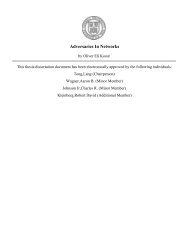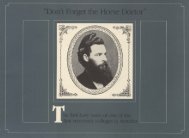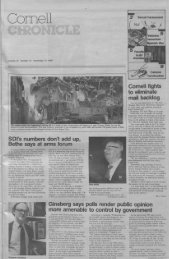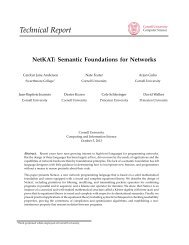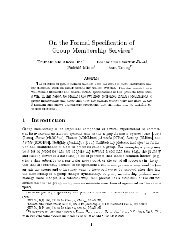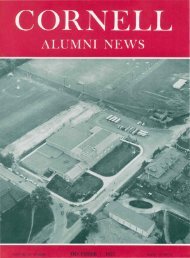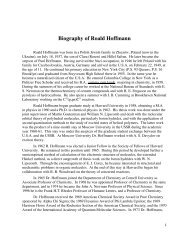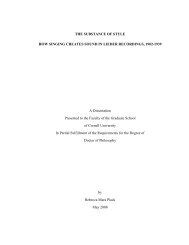Cornell Alumni News - eCommons@Cornell - Cornell University
Cornell Alumni News - eCommons@Cornell - Cornell University
Cornell Alumni News - eCommons@Cornell - Cornell University
Create successful ePaper yourself
Turn your PDF publications into a flip-book with our unique Google optimized e-Paper software.
Sproull on Undergraduate<br />
Education<br />
The Vice President for Academic Affairs talks with<br />
Thomas L. Tobin and Arthur W. Brodeur, Director and Assistant<br />
Director, respectively, of the <strong>University</strong>'s Public Information<br />
Staff, about the steps being taken to improve the quality of undergraduate<br />
education.<br />
• Over the past several years the students, faculty, and administration<br />
of <strong>Cornell</strong> have indicated mounting concern<br />
over the quality of undergraduate education at the university.<br />
In two earlier articles, [December 1965 and January<br />
1966] the NEWS outlined major areas of concern and some<br />
of the changes being studied as a means of enriching the<br />
undergraduate program. In this article, the NEWS interviews<br />
Robert L. Sproull '40, PhD '43, vice president for academic<br />
affairs, to determine what progress has been made in this<br />
critical area. In addition to his duties as vice president for<br />
academic affairs, Sproull serves as both a member and the<br />
planning staff of the <strong>University</strong> Commission on Undergraduate<br />
Education. The commission, made up of students,<br />
faculty and administrators, was formed in October, 1965.<br />
Since that date the commission has met almost on a weekly<br />
basis during the last and current academic years.<br />
Q. Is concern for the quality of undergraduate instruction<br />
new at <strong>Cornell</strong>?<br />
A. Certainly not. My own experience dates back only to<br />
1938, but then it was perfectly clear that the individual<br />
faculty members, department chairmen and deans were<br />
giving tremendous attention to this. The difference is that<br />
attention has been focused in the last three years partly by<br />
events off campus, but partly by our student protests in the<br />
spring of 1965. It especially became focused by the Kahn-<br />
Bowers faculty committee which devoted the summer of<br />
1965 to taking stock of inadequacies, wherever they could<br />
be found, in undergraduate education.<br />
Q. What is the relationship between the university commission<br />
on undergraduate education and the Kahn-Bowers<br />
committee?<br />
A. The Kahn-Bowers committee was a committee to investigate,<br />
to appraise, to recommend. It was not intended to<br />
make changes in undergraduate education. Its report, however,<br />
since it was full of careful appraisal and wisdom,<br />
deserved to be followed up. And that's where the university<br />
commission comes in. The commission is acting as a continuing<br />
organization set up to improve the quality of undergraduate<br />
instruction.<br />
Q. Who are the members of the university commission?<br />
A. There are three students, three faculty and three administration<br />
members, plus the President or provost who<br />
presides. The faculty members were chosen by the dean of<br />
the university faculty; the students by the Executive Board<br />
of Student Government and the administration members by<br />
the President.<br />
Q. Who decided to include students on the Commission?<br />
A. The university faculty voted on the crucial question as<br />
to whether students should be included. There was some<br />
uneasiness among many of the faculty about including students.<br />
I have to admit that I was somewhat uneasy myself.<br />
The students, in fact, have been highly productive members<br />
not only in telling us of student attitudes and evaluating<br />
probable student reactions to suggestions, but also as a<br />
source of productive ideas.<br />
Q. Is the commission the most significant force working<br />
for the improvement of undergraduate instruction at <strong>Cornell</strong>?<br />
A. No. The commission is only the most visible. Probably<br />
the most significant force is simply the increased attention<br />
May 1967 19




